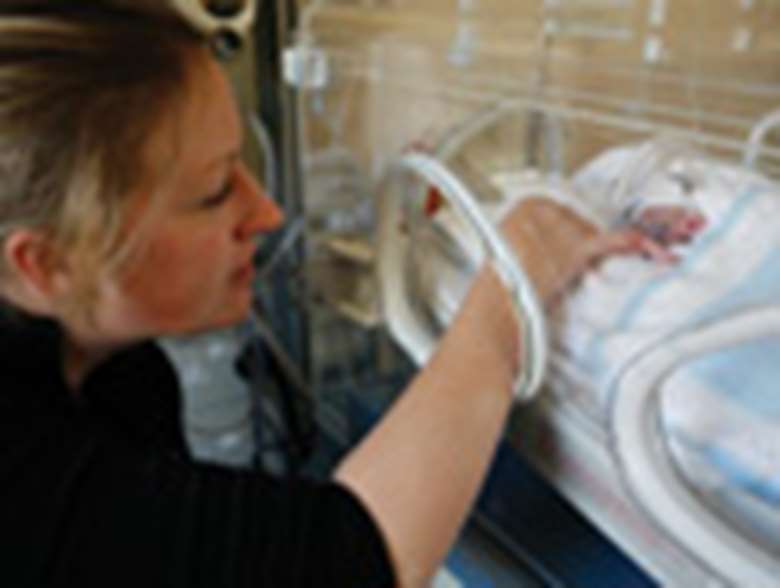Analysis: Health - Maternity services feeling the pinch
Tuesday, December 4, 2007
Within three years the NHS has turned a deficit of more than 500m into a potential 1.8bn surplus. But maternity, neonatal and children's health services are still suffering. Cathy Wallace investigates how staff shortages and budget cuts are affecting services.

When Andrew Canter's wife Rachel went into labour, the couple anticipated a normal, natural delivery. They opted to go to a local birthing centre, safe in the knowledge their nearest general hospital was just seven minutes away.
During labour, midwives detected a problem with the baby's heartbeat. But instead of a short, easy journey to hospital, the couple had to travel for nearly half an hour after being told their local hospital was closed to new admissions. Instead they were taken to a hospital further afield, where baby Jake was stillborn.
Andrew Canter is firm in his belief about what contributed to his son's death. "It was a result of staff shortages and not having units that were fit for purpose, and not having enough resources to keep these units functioning at optimum level," he says.
In 2005, when the Canter's tragic story unfolded, the NHS was in the grip of a deepening financial crisis. Patricia Hewitt, who was health secretary at the time, announced a £512m deficit, which was more than twice as large as the £221m deficit recorded in 2004/05.
NHS surplus
Now, nearly three years on the tables have turned - the NHS is set to record a healthy surplus for 2007/08. Recent leaked documents reveal the figure could be as high as £1.8bn although the Department of Health will not confirm this.
"In the NHS as a whole there seems to be a lot of reconfiguration," Canter says. "In the area where I live there are two acute hospitals, and they want to make one a general hospital, take maternity services away and put them on a bigger site. What they're thinking is bigger hospitals save more lives. But pregnant women aren't ill."
Sean O'Sullivan, senior policy analyst at the Royal College of Midwives, points out the projected £1.8bn surplus, which amounts to about two per cent of the entire NHS budget, is larger than the £1.6bn allocated to maternity services as a whole for 2006/07.
"The maternity budget has fallen in the last year by about £55m," he says. "The Department of Health hasn't given us any justification for it at all. It's a little curious set alongside the commitment the government made last April in Maternity Matters to provide greater choice and continuity of care for women using maternity services."
O'Sullivan also points out the birth rate has been increasing, and is set to continue to grow. But the Department of Health seems to have other ideas. Across England, campaigners are fighting to keep maternity services in their local areas.
In Banbury, Oxfordshire, for example, local residents have formed an alliance to oppose potential changes to children's and maternity services at the Horton General Hospital. The reason for the changes is not financial difficulty, but staff shortages and the impact of the new European Working Time Directive on working hours.
But it's feasible to argue that staff shortages are a direct result of the NHS's mammoth savings drive. O'Sullivan says: "Both NHS trusts and training providers have made drastic cuts. The number of training places has reduced and in addition trusts needed to freeze midwife posts or substitute them with maternity support workers."
Amy Edmunds, media relations manager at premature baby charity Bliss, agrees there is a shortage of nurses and midwives, and says the government needs to spend £75m to address the shortfall in neonatal nurses alone.
Staff shortages
"The problems within the system to do with capacity, information flow, closures and the resulting transfer of mothers and babies across the country to access the care they need, all stem from the shortage of neonatal nurses," she says. "But this issue is separate from that of the NHS surplus. Extra funds need to be committed by the Department of Health specifically to deal with this shortage of nurses."
But Geoff Martin, campaign manager at lobby group Health Emergency, says the pressures on maternity services in hospitals are cash-led. "It's clear there's a shortage of qualified midwives, which is part of the problem," he says. "The government plans to start centralising maternity services, and my view is this is cash-led.
"On one hand there is an argument that smaller maternity units are unsafe, and this is an argument that is being used to attempt to downgrade maternity services at my local hospital. But local residents do not accept that. They think it is a very safe service."
UNDER THREAT
Areas where maternity services are being reviewed include:
- Blackburn
- Burnley
- Bury
- Eastbourne
- Epsom
- Gloucestershire
- Hastings
- Rochdale
- Salford
- Trafford




